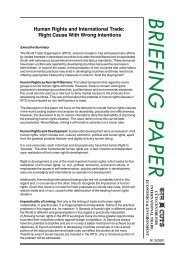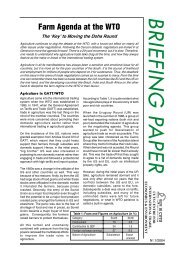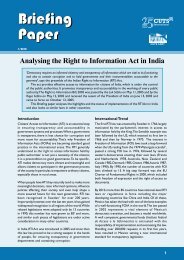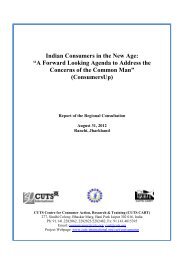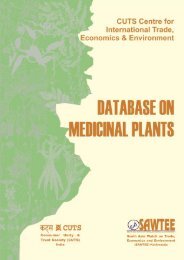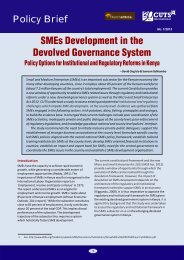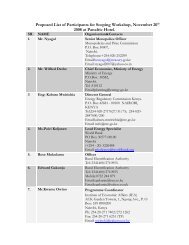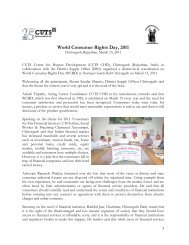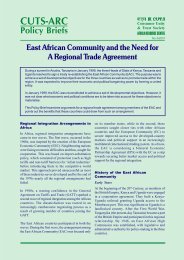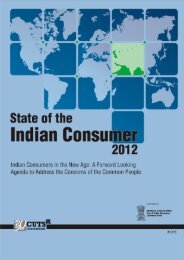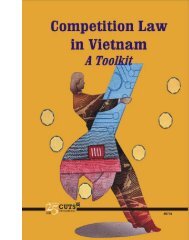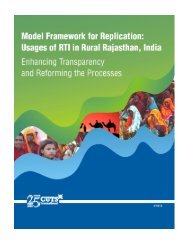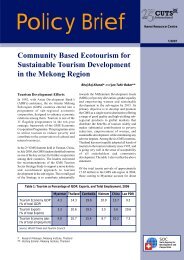Final Report - World Trade Organization
Final Report - World Trade Organization
Final Report - World Trade Organization
You also want an ePaper? Increase the reach of your titles
YUMPU automatically turns print PDFs into web optimized ePapers that Google loves.
and greater spread of ownership are some of the<br />
objectives of the South African Competition Act of<br />
1998. These broad objectives reflect the fact that<br />
competition law and policy are not stand-alone issues,<br />
but are an integrated part of a country’s overall public<br />
policy.<br />
On the other hand these multiple objectives create<br />
possibilities for lobbying by different stakeholders and<br />
can lead to an inconsistent application of competition<br />
law. In implementing competition law authorities<br />
should certainly consider a country’s wider economic<br />
and development policies and objectives, however<br />
including them as objectives of the law itself suggests<br />
that competition law is a tool for attaining them.<br />
Arguably competition law and policy are not the most<br />
apt tools for the promotion of employment or the<br />
advancement of historically disadvantaged persons.<br />
A focus on consumer welfare and economic<br />
efficiency, while taking regard of other policies, might<br />
therefore be preferable.<br />
In general, the laws of the project countries are<br />
comprehensive enough to deal with the variety of<br />
practices and activities that infringe on competition<br />
in their markets. The three key areas that the<br />
competition laws in all project countries deal with<br />
are (i) restrictive trade (or business) practices; (ii)<br />
the control of monopoly power or a dominant position;<br />
and (iii) mergers and acquisitions.<br />
2. Restrictive <strong>Trade</strong> Practices should be<br />
categorised in those that are prohibited per se<br />
and those that are subject to a rule of reason,<br />
case-by-case, approach with the onus, once anticompetitive<br />
behaviour is established, on the<br />
companies involved to justify them. Categorisation<br />
into RTPs that are prohibited per se should be<br />
rationalised.<br />
With respect to restrictive trade practices all 7-Up<br />
countries apply a ‘rule of reason’ analysis to at least<br />
the majority of these cases. Although they are<br />
deemed prima facie anti-competitive the majority<br />
are not prohibited per se. Except for Sri Lanka the<br />
onus to justify them is on the companies involved. In<br />
Sri Lanka the competition authority must establish<br />
that the practice is against the public interest. Placing<br />
the onus on the companies involved seems a better<br />
option to reduce the burden on the authorities.<br />
Several countries prohibit a number of restrictive<br />
trade practices per se. In general these practices<br />
are considered to be the most serious restrictions on<br />
competition. However, the reasons why a distinction<br />
is made are not always clear. The Tanzanian and<br />
Kenyan law, for instance, prohibit predatory pricing<br />
and collusive tendering per se (i.e. persons engaged<br />
in these practices shall be guilty of an offence),<br />
whereas agreements to divide markets or refusal to<br />
sell, which can be equally or even more damaging to<br />
competition and consumers, are considered to be<br />
legally unenforceable in a court of law. Persons<br />
committing these kind of restrictive trade practices<br />
are only guilty of an offence after they refuse to<br />
comply with orders from the authorities to stop the<br />
practices. This has caused much confusion, even<br />
among enforcement agencies. Therefore the<br />
categorisation of per se prohibited practices should<br />
be rationalised.<br />
3. The size of a company’s market share could<br />
be the main factor in determining the existence<br />
of dominance. However, other factors also need<br />
to be taken into account.<br />
When determining whether or not a company holds<br />
a dominant position, the 7-Up countries heavily rely<br />
on the size of that company’s market share. There<br />
are, however, a number of difficulties in determining<br />
a company’s market power by the size of its market<br />
share. These include the question on how to define<br />
the relevant market as well as market entry issues.<br />
Very large market shares can in themselves be<br />
evidence of a dominant situation. Where to draw the<br />
line, however, is very much dependent on a country’s<br />
specific circumstances. Although taking market<br />
shares as the main factor in determining dominance<br />
seems to be a good approach, especially given the<br />
authorities’ capabilities, other factors need to be taken<br />
into account to determine whether or not a company<br />
is, to an extent, capable of operating independently<br />
from its customers and competitors.<br />
4. Some countries still follow a structure- oriented<br />
approach in their competition law enforcement,<br />
which may consider turning to a behavioural<br />
approach.<br />
In controlling monopoly power or a dominant position,<br />
the countries have adopted a more or less behavioural<br />
approach. It is not dominance itself that is prohibited,<br />
but its abuse. The one notable exception to this is<br />
Pakistan’s attitude towards the concentration of<br />
‘personal’ power. Due to historical developments that<br />
led to the concentration of wealth and power in the<br />
92 w Pulling Up Our Socks



